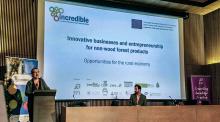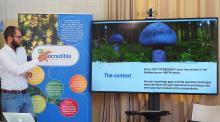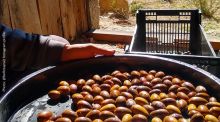A Mediterranean Partnership to improve and exchange scientific and practical knowledge on lentisk tree oil

INRGREF (Tunisia) and its five partners are pleased to announce the launch of MEDLENTISK project. Funded by the Erasmus+ Programme of the European Union, this project aims to promote the exchange of good practices around the Mediterranean on the little-known lentisk tree and its vegetable oil. It is still produced in a traditional way, which influences the yield and quality of the extracted product. The composition and therapeutic virtues of this oil have also been little studied, even though this shrub is found throughout the Mediterranean area and seems to have significant qualities.
In order to do so, six partners from the South, East and North of the Mediterranean Sea have come together to improve interest and access to scientific and practical knowledge on lentisk tree’s oil:
- AIFM (France), coordinator
- University of Cagliari (Italia)
- Mediterranean Agronomic Institute of Chania (Greece)
- National Institute for Research in Rural Engineering, Water and Forestry (Tunisia)
- Technical University of Bursa (Turkey)
- Provence Model Forest Association (France)
The partners will meet three times to increase their level of knowledge on mastic tree, to exchange good practices and challenges, and to discuss the problems and difficulties of this sector. Best practices will be identified; their synthesis and translation will then be summarized in easy-to-understand formats for good dissemination to all stakeholders. The results of the exchanges will be shared during a side event to be organised at a forthcoming international meeting on Mediterranean forests.
For any questions, remarks or interest on the MEDLENTISK project, please feel free to contact Boutheina STITI (stitibou@gmail.com), Faten MEZNI (faten-mez@hotmail.com ) and Anaïs Loudières (anais.loudieres@aifm.org ).
MEDLENTISK consortium considers that if managed sustainably, "forests and wooded areas are one of the main sources of raw materials and sustenance for the world's population. Wood is their most common and well-known product but, in addition to this, forests produce a large variety of non-wood products (called NTFPs) such as resins, and edible products such as fruits and mushrooms. Non-wood forest products (NTFPs) are the main means of subsistence of people living near forests. Local populations are generally involved in the collection, processing and trading of their products".















 El proyecto INCREDIBLE recibe fondos del programa Horizon 2020 de la Comisión Europea en el marco del acuerdo de subvención Nº 774.632.
El proyecto INCREDIBLE recibe fondos del programa Horizon 2020 de la Comisión Europea en el marco del acuerdo de subvención Nº 774.632.
Comentarios (159570)
Психолог
Психолог
Психолог
Психолог
Психолог
Психолог
Психолог
Психолог
Психолог
Психолог
Психолог
Психолог
Психолог
Психолог
Психолог
Психолог
Психолог
Психолог
Психолог
Thank you for the good writeup. It actually was a entertainment account
it. Look advanced to more introduced agreeable from you!
By the way, how can we keep up a correspondence?
my blog; https://dontbefooltrading.com
Психолог
Excellent way of describing, and nice piece of writing to take data regarding my
presentation subject, which i am going to deliver in university.
Also visit my web page: keto ice cream
Психолог
Психолог
Психолог
Психолог
Психолог
Психолог
Психолог
Психолог
Психолог
Психолог
Психолог
Психолог
Психолог
Психолог
Психолог
Психолог
Психолог
Психолог
Психолог
Психолог
Психолог
Психолог
Психолог
Психолог
Психолог
Психолог
Психолог
Психолог
Páginas
Add Comment